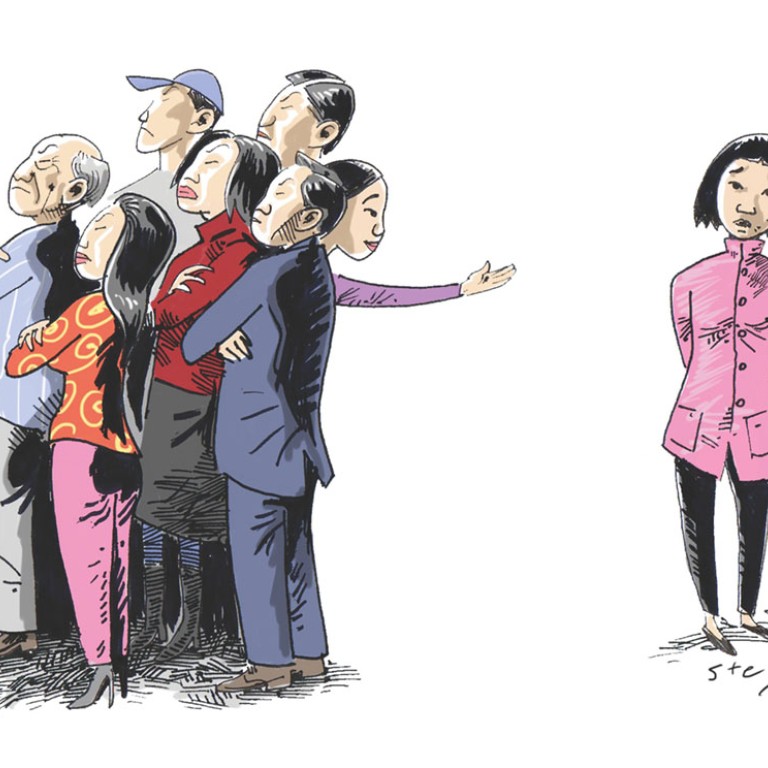
Hong Kong should help vulnerable mainland immigrants, not denigrate them
Linda To says society should do more to help mainland women who migrate to Hong Kong as they are already socially and financially vulnerable, without having to deal with local prejudice
A recent 12-episode TVB drama titled included a story about a new mainland immigrant who faces ill treatment and discrimination in Hong Kong. On arrival, she was accused of smuggling milk powder. Later in the story, her new neighbours scolded her and her daughter simply for watching TV.
The drama raised heated debate here. The day after it was broadcast, the Office of the Communications Authority received some 1,500 complaints about it. Nasty comments were also posted on social media, saying the show humiliated Hongkongers with its poor portrayal of them.
Many said the problem lay with the mainland Chinese, whom some have disparagingly described as "locusts". Their litany of grouses include that mainland visitors use Hong Kong's resources, and their shopping causes shortages of milk powder, cosmetics, medicines and more; their misbehaviour - such as allowing their children to urinate in public places - is offensive, and they pay no respect to our core values and the local culture, such as queuing to pay for services.
These hostile feelings are increasingly common.
In the past 10 years, some 500,000 people have come to reside in Hong Kong from mainland China via one-way permits. Each year, millions more come here as tourists. Many Hongkongers are finding it very hard to cope with this demographic change. Without a well-planned government strategy to ease the situation, conflict between Hongkongers and mainlanders is becoming more pronounced. It's no wonder that the TV show produced such an outpouring of frustration.
However, we need to learn to see from other perspectives.
While there have been cases of mainlanders causing trouble, the majority of them do not. More importantly, the TV show reflected the real-life experiences of some new immigrant women.
In the past 10 years, more than 350,000 mainland women have moved to Hong Kong, and many have faced discrimination in different aspects of their life here, from job interviews to grocery shopping.
For 10 years, I have led the HER Fund, which advances the rights of women and girls through fundraising, grant-making and philanthropic education. Some of the organisations we fund provide a hotline service and organise mutual support groups for new immigrant women. They also engage in rights advocacy work.
From working with such organisations, we know that these women long to integrate into Hong Kong society and adopt the local language, style of dressing and cultural habits. They are happy to have Hongkongers as friends and feel grateful to those who lend them a hand.
However, due to our current tensions with mainland migrants, they are often afraid to disclose their identity in public places. Because of their mainland accent, they stay silent so that people will not identify them as new immigrants. "Even when I was just asking how much something cost in the wet market, one hawker became annoyed and scolded me," one of these women told me.
Even those who are more assertive and aware of their rights spoke of a similar worry. At campaign events, many of them preferred not to show their faces and wore a mask instead, because they were afraid that their identity as a new immigrant would cause their children to suffer discrimination in school.
The situation is worse for women who suffer abuse by their Hong Kong husbands. As housewives, many are socially isolated and financially dependent on their husbands. Discriminated against and without welfare support, they are vulnerable to emotional distress.
In the past, there have been cases of family tragedies where new immigrant women who were victims of domestic violence killed themselves and their children, because they felt they had no one to turn to for help.
We need to help them by giving them information about women's shelters and hotlines, where they can find solace by joining groups that provide peer support.
It is disappointing that despite their great need, the government has provided no specific resources or support services to new immigrant women to help them adjust and integrate into society. All the current social services, like adjustment classes, vocational training and counselling, are run by private initiatives, like the ones that HER Fund supports. These are not necessarily sustainable as the funds that support them are mostly given on a project basis.
As the number of immigrant women continues to grow, the Hong Kong government needs to invest in programmes to help them.
Hong Kong residents need to stop the discrimination and labelling of the marginalised. New immigrant women are Hong Kong residents. They are contributing to our society as caretakers of their family and children, nurturing the young generation of our society.
They deserve better treatment and their human rights should be safeguarded. Together, we can ensure that this happens. And we can start by respecting the immigrants in our own neighbourhoods.
